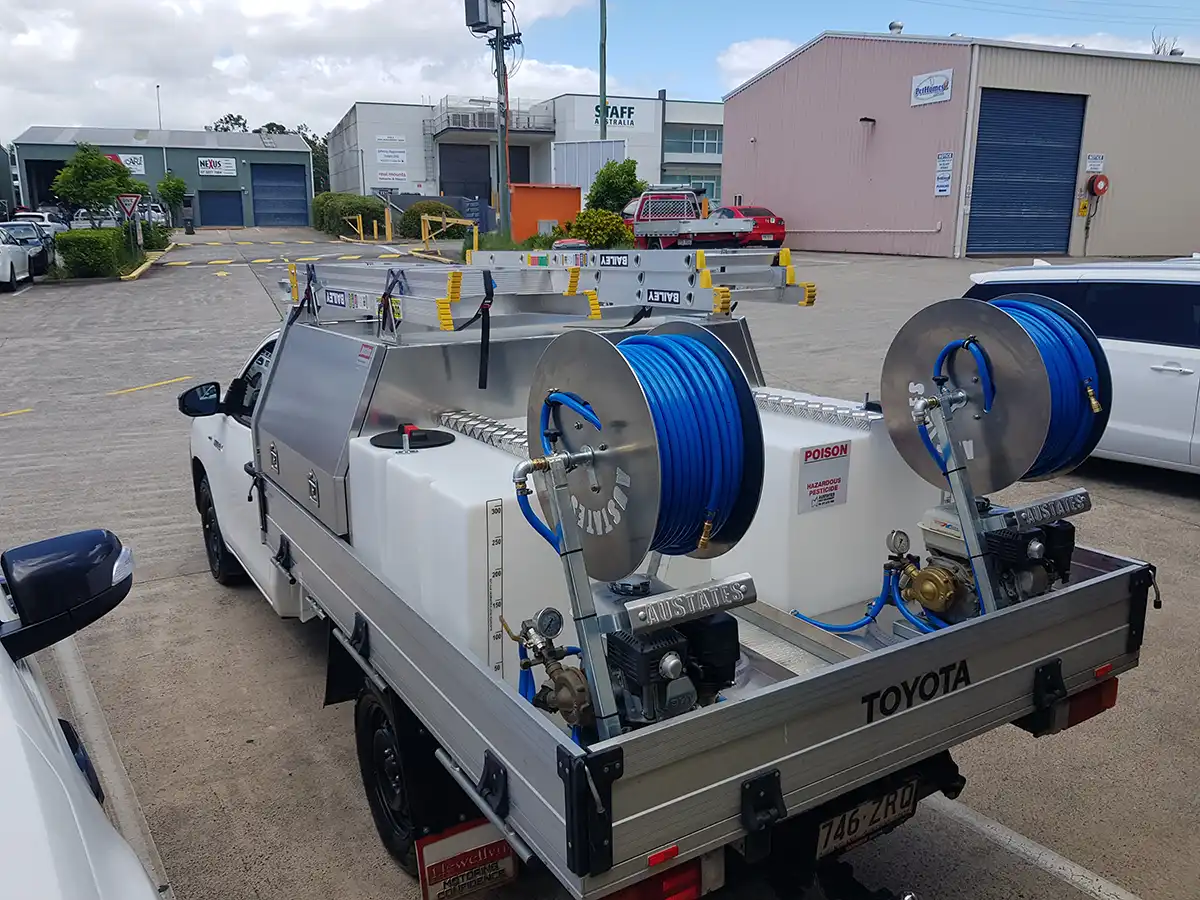The need for industry-specific pest control strategies is crucial across various sectors, each facing distinct challenges from minor nuisances to significant health and financial risks. From ensuring hygiene in the food service industry, and maintaining sterile environments in healthcare, to protecting crops in agriculture, tailored pest control is essential. This exploration will cover the unique challenges of these sectors, highlight the need for customised pest control techniques, and emphasise the importance of quality equipment and expert advice. It’s important to understand the value of investing in specialised pest control knowledge and solutions to protect businesses and their customers.
The Need for Industry-Specific Pest Control Strategies
The necessity for industry-specific pest control strategies stems from the unique challenges each sector faces, making a generalised approach ineffective. Key reasons for tailored strategies include:
Varied Pest Attractions: Specific pests target different industries (e.g., rodents in food services, bedbugs in healthcare), requiring customised control strategies.
Regulatory Compliance: Tailored pest management ensures each industry meets its specific health and safety regulations, protecting public health and reputation.
Economic Impact: Pests can spoil inventory or harm crops, causing financial losses. Sector-specific strategies prevent these issues, protecting profits.
Environmental Considerations: Pest control’s environmental impact demands sector-sensitive approaches, like in agriculture where it’s crucial to protect beneficial insects and avoid contamination.
Reputation Management: Effective, discreet pest control is vital in industries like hospitality to prevent damage to business reputation and ensure customer trust.
The diversity of challenges across sectors highlights the need for specialised pest control strategies. Leveraging expert knowledge ensures businesses can address these issues effectively with tailored solutions.
Overview of Common Challenges in Different Sectors
Industries across the board face distinct pest control challenges, each with its own set of consequences for failing to manage these issues effectively. The diversity of these challenges necessitates a tailored approach to pest management, understanding that what works for one sector may not be suitable for another.
- Food Service Industry: Vulnerable to pests like rodents and flies due to food waste, posing risks of contamination and reputational damage.
- Healthcare: Requires sterile environments to prevent infections, with the challenge of implementing safe yet effective pest control in sensitive settings.
- Agriculture: Deals with pests affecting crop yield and quality, needing careful pesticide management to avoid resistance and environmental impact.
Let’s dive deeper into each sector.
Food Service Industry
The food service industry faces high risks of pest infestations, such as rodents, flies, and cockroaches, which can contaminate food. A strong pest management strategy is crucial for food safety and customer confidence. Essential elements of an effective pest management plan include:
Sanitation Measures:
- Enforce strict waste management to limit pest food sources.
- Maintain regular cleaning to remove residues from surfaces and equipment.
- Store food in sealed containers to prevent pest access.
Structural Maintenance:
- Seal openings to block pest entry.
- Install screens on windows and vents.
- Use door sweeps and seals to close gaps.
Pest Control Treatments:
- Place baits and traps strategically for monitoring and control.
- Schedule regular professional pest control services.
- Select safe treatments for food areas.
Regular Inspections:
- Perform routine checks for pest signs.
- Evaluate high-risk areas like kitchens and waste disposal zones.
- Take quick corrective action for any pest issues found.
Integrated Pest Management (IPM):
- Embrace IPM for prevention, monitoring, and control.
- Prioritise non-toxic methods, using chemicals as a last resort.
- Customise strategies to meet the food service’s specific needs.
By concentrating on these critical aspects, food service establishments can forge a strong pest management strategy, reducing contamination risks, safeguarding public health, and maintaining their reputation.
Healthcare
Healthcare facilities, including hospitals and clinics, must prioritise patient safety while managing pests. Their pest control strategies emphasise non-chemical methods and prevention, with careful chemical use. Key strategies are:
Stringent Sanitation Practices:
- Follow strict cleaning protocols to remove pest food and water sources.
- Properly dispose of medical waste to avoid attracting pests.
- Clean ducts, vents, and hidden areas to prevent pest breeding.
Careful Use of Pesticides:
- Choose healthcare-approved pesticides, focusing on safety.
- Apply treatments specifically, avoiding broad use to reduce exposure.
- Partner with experienced pest control professionals for compliant management.
Non-Chemical Methods:
- Install door sweeps, screens, and seal entries to block pests.
- Use light and sticky traps for monitoring and controlling pests.
Regular Monitoring and Inspections:
- Implement a routine pest monitoring program.
- Inspect patient areas, kitchens, and waste sites thoroughly.
- Train staff to recognize and report pest sightings.
Rapid Response to Pest Sightings:
- Have a clear action plan for pest detections.
- Coordinate quick interventions with pest control experts.
- Regularly review and adjust strategies based on pest activity.
Integrated Pest Management (IPM) in Healthcare:
- Embrace IPM, focusing on prevention and minimal chemical use.
- Engage all staff in pest management, ensuring a collective effort.
- Customise control measures to the facility’s specific needs.
By adhering to these strategies, healthcare facilities can manage pests effectively, ensuring patient health and compliance with healthcare standards
Agriculture
Agricultural pest control is essential for crop protection, focusing on minimising risks and employing Integrated Pest Management (IPM) for a comprehensive approach. Key strategies are streamlined as follows:
Biological Control:
- Use natural predators or parasites against pests.
- Introduce beneficial insects to target pest species.
Cultural Practices:
- Rotate crops to break pest life cycles.
- Plant cover crops for soil health and pest deterrence.
- Adjust planting and harvest times to evade peak pest periods.
Physical and Mechanical Controls:
- Install barriers like nets to block pests.
- Use traps or devices to decrease pest numbers.
Chemical Controls:
- Apply pesticides sparingly, choosing eco-friendly options.
- Employ precision techniques to reduce usage and exposure.
Use of Pest-Resistant Crop Varieties:
- Select genetically resistant crops.
- Utilise GMOs for enhanced resistance where viable.
Soil Health Management:
- Enrich soil organically to bolster plant health.
- Practice soil conservation to maintain natural pest controls.
Conservation of Natural Predators:
- Foster habitats for beneficial organisms.
- Limit broad-spectrum pesticides to protect these allies.
Monitoring and Thresholds:
- Scout fields regularly for pest activity.
- Set action thresholds for timely pest control interventions.
Integrating these strategies allows agriculture to effectively control pests, supporting sustainable practices and ecological balance. The aim is to keep pest levels manageable without significant economic impact, reducing dependency on chemical pesticides.
Customising Techniques
Assessing the Unique Needs of Each Industry
Customising pest control techniques starts with a thorough assessment of the specific needs and challenges of each industry. This involves analysing the types of pests involved, the potential risks to the business, and any regulatory requirements. Based on this assessment, pest control strategies can be tailored to offer the most effective and efficient solutions.
Tailoring Approaches for Maximum Effectiveness
The customisation of pest control strategies involves selecting the right combination of methods and tools for each situation. This might include specialised equipment, specific pesticides, or unique application techniques. The goal is to achieve maximum effectiveness while minimising risks to people, property, and the environment.
By understanding the unique needs and challenges of each sector, businesses can develop effective pest management plans that protect their operations, customers, and reputation. Companies like Austates play a vital role in providing the expertise and equipment necessary for these tailored solutions. As industries continue to evolve, the need for specialised pest control strategies will only grow, making it essential for businesses to prioritise and invest in industry-specific pest management expertise. For more information on how Austates Pest Equipment can help tailor your pest management business needs, contact us or visit our website.




